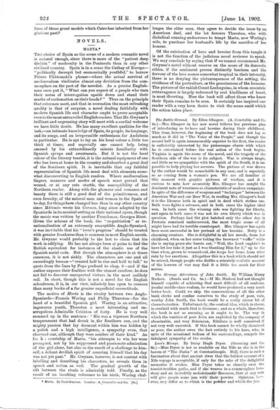The Battle Ground. By Ellen Glasgow. (A. Constable and Co.
6s.)—Mrs. Glasgow in her new novel follows her previous plan of introducing us to hero and heroine during their childhood. This time, however, the beginning of the book does not lag so much as it did in "The Voice of the People," and though the second half is again immeasurably superior to the first, the reader is sufficiently interested by the picturesque charm with which he is entertained before the real action of the book begins. Virginia is again the scene of the novel, and the tragedy of the Southern side of the war is its subject. War is always tragic, and little as we sympathise with the spirit of the South, it is im- possible to help pitying her sorrows. The picture of war drawn by the author would be remarkable in any case, and is especially so as coming from a woman's pen. We are all familiar at this moment with graphic pictures of warfare, and it is curious to note how accurately Mrs. Glasgow has caught the dominant note of weariness so characteristic of modern campaigns. In spite of the difference of weapons and " technique " between the American War and our Boer War, in reading Mrs. Glasgow's book it is the likeness both in spirit and in deed which strikes one. Both were fights a out ranee, and in both cases the higher ideal won. In both cases the winning side was fighting for liberty, and again in both cases it was not its own liberty which was in question. Perhaps had the plot hatched only the other day in Pretoria remained undiscovered, the most tragic scene of all might have had its terrible counterpart. Mrs. Glasgow has again been most successful in her portrait of her heroine. Betty is a charming creature. She is delightful in all her moods, from her childhood, when on her sister taking the brownest " waffle " while she is saying graze she bursts out, "Well, the Lord oughtn't to have let her take it just as I was thanking Him for it," up to the time when, grown to womanhood, she keeps her home from utter ruin by her exertions. Altogether this is a book which should not be missed, though people who dislike a minutely realistic account of the horrors of war may find it a little too much for their nerves.










































 Previous page
Previous page